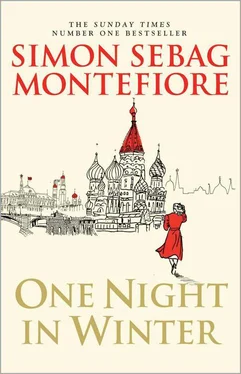George put his hand on Andrei’s arm with all the warmth that was lacking in his father. ‘Listen, Andrei, I know you want to get into the Komsomols and I’ve been singing your praises to Marlen. But it would be fun to have you join us in the Fatal Romantics’ Club. We’re planning to play the Game.’
Andrei felt a stab of excitement. This was what he really wanted – wasn’t it?
‘But there’s a problem,’ George continued. ‘It’s Nikolasha’s club and he wants to make it harder to join than the College of Cardinals or the Politburo. And Nikolasha says he’s not sure about you.’
Andrei swallowed. ‘What do you mean?’
‘He doesn’t know you as well as I do,’ George said. ‘Anyway, he says Serafima has the casting vote.’
‘Serafima? But Serafima doesn’t know me either. And I’m not sure sure she cares about anything, especially not the Fatal Romantics’ Club.’
‘But Nikolasha cares about her, and that’s the important thing.’
‘But isn’t he with Rosa? She adores him.’
George nodded. ‘She does, but Nikolasha lives for Serafima. In fact, sometimes I think the entire Fatal Romantics’ Club is really for her.’
Andrei stood up. He cared about this more than he meant to – and he had shown it all too clearly.
‘You helped me out,’ George said, standing too, ‘and I know you’re one of us. They’re planning to play the Game right after the Victory Parade so you have to join before then. It’s a special ritual.’
George led Andrei out of the study, across the corridor to his bedroom where he pulled from under his bed an olive-green leather case, which he flicked open. There, lying in red velvet, were two nineteenth-century duelling pistols.
‘Beautiful,’ said Andrei. He closed his eyes, remembering his Onegin.
Now nothing else mattered –
A brace of pistols and a shot
Shall instantly decide his lot.
Andrei admired the pistols: the bevelled barrels, polished wood, burnished steel. ‘Are they real?’ he asked.
‘I doubt it. We borrow them from the Little Theatre. They use them in plays,’ George said, laughing. ‘And we’re going to use them in the Game – you’ll see.’
A few streets away, School 801 was not quite empty. The janitor mopped the floors of the empty corridors with the disinfectant that gives schools their characteristic pungency, and the director, Kapitolina Medvedeva, was alone in her office planning how the school would celebrate the Victory Parade on 24 June. It was getting closer. A few Komsomols and Pioneers would be chosen to serve in honour guards. And when she thought about this, she wished she could include Andrei Kurbsky because she knew how much it would mean to a boy of tainted biography.
The report on her desk showed that Andrei was thriving in the school and she was proud that she had overruled Rimm to let him in.
‘I wish to register my disapproval of the acceptance of a child of an Enemy of the People,’ Rimm had said. He believed Medvedeva was not Party-minded enough, and he wanted her job. She knew that every school, every institution had a Rimm. They were usually cowards so she’d stood her ground.
‘Fine,’ Rimm had surrendered. ‘Let him in if you must, but a family like his won’t be able to pay the fees.’
‘Actually, comrade, they can afford the fees,’ she’d responded, and smiled as she thought about the opportunity she was giving Andrei. He was her special project and she approved of his neat, reserved appearance, his parted brown hair and dark-framed spectacles. And he was already friends with George Satinov, Minka Dorova and Rosa Shako.
Kapitolina Medvedeva was a devout Communist, who believed that loving children too much made them egotistical. She was proud to be the director of a school with pupils from such eminent Party families. She was not impressed by the clammy and rather menacing pallor of Comrade Dorov, but his wife Dashka managed to be both chic and a doctor. Marshal Shako, the commander-in-chief of the air force, was the very model of a Soviet commander. And as for Comrade Satinov, he was so impressive that, when she spoke to him, she stammered and over-egged her compliments. There was something about Comrade Satinov. Perhaps it was because he was the real thing: he had done time in the Tsar’s jails, helped storm the Winter Palace in 1917, known Lenin, spent the winter of ’42 in Stalingrad. And no one was closer to Stalin himself.
Kapitolina Medvedeva had taught Stalin’s own children just before the war. Svetlana loved history – and came almost top of her class. But Kapitolina had failed to teach anything to his son, Vasily. The boy had been a delinquent scoundrel. Still, it must be hard to have the greatest titan in world history as your father.
She looked down at her desk to read Benya Golden’s report on Andrei. The hiring of Golden was another decision she had made over Rimm’s head, and he had turned out to be the best teacher she had ever known. Besides, how could any headmistress pass up the chance to employ the author of Spanish Stories ?
She took off her glasses and rubbed her eyes. When she put them on again, she noticed that she could see herself in the reflection on her polished inkwell. Was it the distortion of the reflection or did she really look that frayed? What a sight she was! She had grey streaks in her hair, and her nose was more like a beak! There’s not much one can do with a face like mine, she thought.
She was a spinster, living alone in one room in a kommunalka on the outskirts, her only luxury being a little set of antique Tolstoys in brown leather bindings. A woman had more important tasks in life than lipstick and dresses, she told herself. The school was her mission in life, and she had to be as hard and modest as a Bolshevik should be.
She had taken two risks in her professional life but both were consistent with her mission: to educate and enlighten – even in an age of ice.
She looked at her watch. It was after seven, and she had nowhere else to be. She sighed, admitting to herself that she now groaned aloud when she got out of bed or the bath – or when she sipped at a particularly delicious soup. She was fifty-two. Getting older.
She closed her eyes, thinking about Benya Golden. She enjoyed having him around the school, and when he fixed her with his playful blue eyes, she actually blushed. Sometimes she dreamed of him at night. She knew he would be wonderful to kiss and she felt that the touch of his hands would transform her. Her hair would grow thicker; her skin would become as rich and tanned as that of Minka’s mother, Dashka Dorova. With him, she could become the woman she had always wanted to be.
She shook her head. Golden was a real gamble, not just because Dr Rimm had denounced his teaching style as ‘a bourgeois circus act of philistine anti-Party hucksterism’. She didn’t know the details of his case, of course; only the Organs, the secret police, knew that, but she knew that no one had expected Golden to return from prison or exile or wherever he’d been. The Organs hadn’t stopped her hiring him so they must have checked him out and cleared him, but however charming and exuberant Golden was, he still had the power to destroy her.
‘Don’t you know what Golden is? He bears the mark of Cain on his forehead. He’s like a leper!’ Rimm had whispered to her. ‘He’s a “lucky stiff”. He’s come back from the dead.’
‘He’s alive now,’ she’d replied. ‘And that’s what matters.’
She perused the report again, but thoughts of Golden and Andrei still filled her mind. Andrei was a safer bet than Golden, but he too was a liability who could harm her. Because what no one else knew – least of all Andrei himself – was that she had accepted him into the school not in spite of his tainted background but because of it. And she was paying his fees out of her own salary.
Читать дальше












